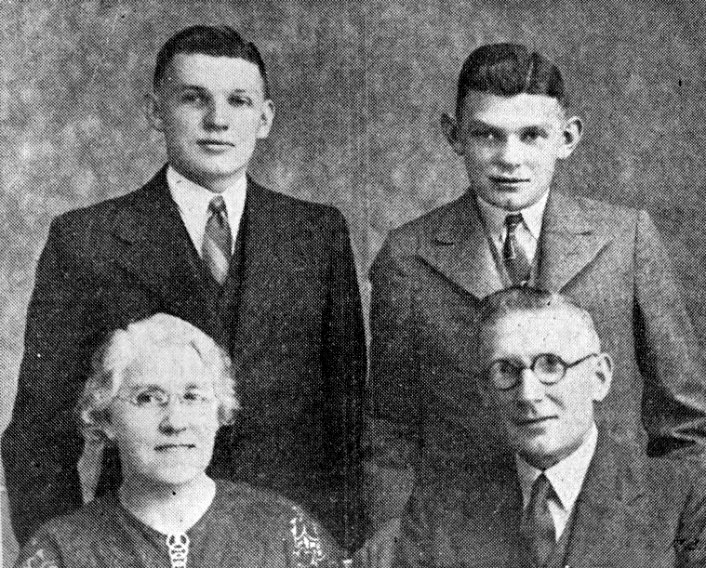Mexborough and Swinton Times May 27, 1938
Good Word for Road Manners

Mr. A. V. Green, Mrs. Green (formerly Miss Annie Davies, of Wombwell Main) and their two sons, Norman (23) and Don (21). Mr. and Mrs. Green and their sons, who live in Australia are at present spending a holiday in England, and are staying with Mrs. Green’s nephew, Mr. Cedric Davies, 34, Mellor Road, Wombwell.
Fifty years of age and he has never seen snow. This gentleman was interviewed in Wombwell by a “Times” reporter the other day. He is Mr. Albert V. Green, of Wollongong, New South Wales, Australia. “I came over to England to see snow,” he said, with the broad smile of the hardy colonial, “but I have not even seen rain yet.” His hopes of seeing snow have now almost vanished, but our reporter assured him that there is still a possibility of the weather clock seeing his way clear to oblige him—that snow in May time is not altogether unheard of.
Although he was born in Australia of Australian parents—his mother’s forbears have been in Australia for many generations—he has a special tie with Wombwell.
He married Miss Annie Davies, a sister of Mr. Tom Davies, who at present is paying a return visit to Wombwell after an absence of 37 years. Miss Annie Davies was fifteen years of age when she went out, 34 years ago, and the couple have been married 26 years. With them have come two fine sons, aged 21 and 2:3, and the four are touring the country by car, which Mr. Green secured in London for the “duration.” They have already covered Wales and other parts of the country. They are here for a long holiday.
Big Business.
Mr. Green is a newsagent on a large scale employing a great number of assistants and running a large modern store on a site which commands in the real estate market £500 per foot of frontage.
Mr. Green has found every day in England full of interest because in many respects he sees life in sharp contrast to what he has been accustomed to. There is a ” compactness ” about this country which he never fully appreciated until he saw the tiny whitewashed homesteads in the mountains of Wales and the built-up areas of Wombwell and other towns and cities in the industrial north. “Your streets are very narrow compared with the spacious boulevards of the Australian towns,” he said, “and everything here looks as though it is getting old.”
He reminded our reporter that Australia is twenty or thirty times as large as England and the population in the Commonwealth only one-eighth of ours, and that largely in the cities. Australia has no winding lanes and green hedgerows; the fields, or “paddocks” as they call Ahem, are of enormous size, “One thing I have noticed about your streets,” he said. “Your gutters are only a few inches deep, whereas ours are nearly a foot deep. That is because of the heavy rains in Australia. If our gutters were as shallow as yours the shops and houses would be flooded in an hour.”
“Green and Pleasant.”
He has never seen anything so lovely and fresh as the English country-side, and he can well understand the Englishman’s yearning for home after being settled abroad for many years. Mr. Green cannot understand how it is that, after being without rain for many weeks England is still green “After such a drought,” he said, “everything, would be as bare as a backyard in Australia.” He mentioned that in the district where Wollongong is situated temperatures often reach 95 and a 100 degrees in the hot season
Regarding industrial’ conditions, Mr. Green says he thinks they are better off in. Australia. The cost of living is certainly higher in the Commonwealth but so are wages. On the whole, he thinks the Australians have a higher standard of living. Instances he mentioned showed that job for job the wages in Australia were just about double ours. He said Australia was experiencing the full benefits of trade revival and there ‘ was a great demand for good men. Australia had unlimited resources and needed only labour. English emigrants were very welcome, and skilled tradesmen need have no fear of being workless. “What Australia wants,” he said, “is good class families.” Miners were able to save money and a great many of them owned their own houses and their own cars. This
No Dole Without Work.
There is no “dole” system in Australia as we know it here. Those who lose their jobs are helped to the extent perhaps of half wages but they have to do the equivalent in work on the highways and so on. Unemployment is now down to the minimum.
Mr. Green says that social distinctions are practically unknown in Australia. Jack is as good as his master, and there is no “sir-ing” or salaam-ing in the shops.
Here is an unsolicited testimonial upon which we can congratulate ourselves. Having travelled two thousand miles in something like four weeks, Mr. Green says there is a much higher standard of courtesy on the roads of England than in Australia, where they cut in without compunction and drive out of side streets at incredible speeds. He thinks the consideration shown by lorry and ‘bus drivers in this country is an example to Australia.
Admires English Hospitality.
“A jolly fine place” is what Mr. Green thinks of England generally, though there are, certain respects in which Australia, which started with a clean sheet when England was already old, can give this. country a few points. He says the people here are not so free at making up to strangers as the Australians, but he thinks English loyalties are deeply rooted and certainly’ he’ has “never met a better people for genuine hospitality.” Mr. Green is ‘going, to see the Empire Exhibition at Glasgow at the first opportunity.